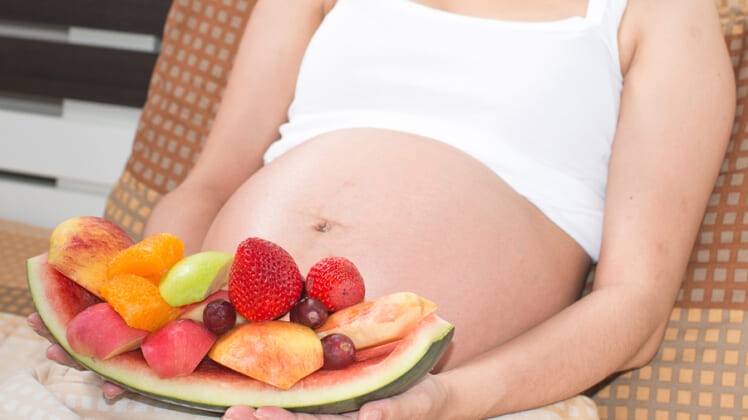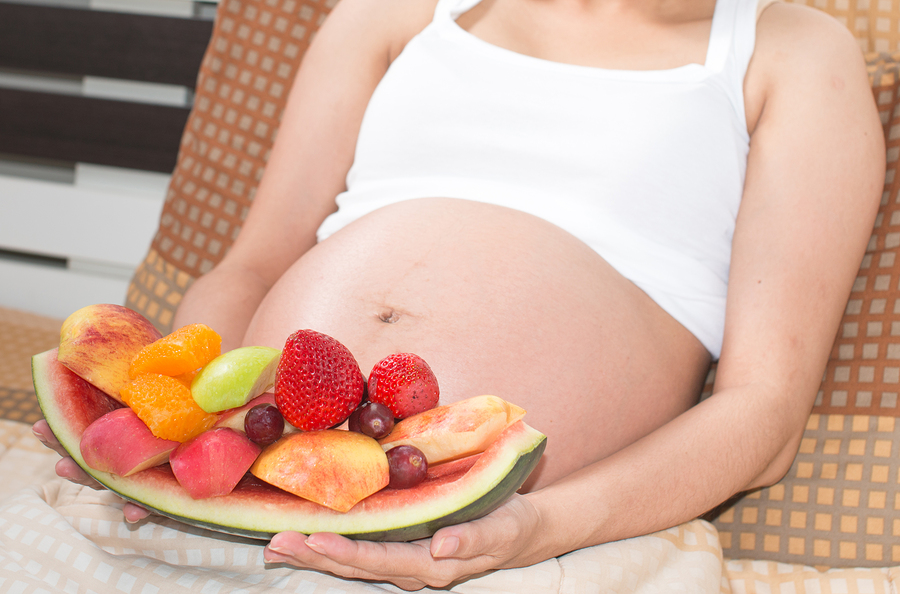

Along with helping you to avoid heartburn, constipation, and indigestion, all common during pregnancy, there are a number of other reasons to keep your diet as nutrient dense as possible. Your baby is connected to the placenta by the umbilical cord which carries nutrients straight to the baby. This is the sole nourishment the baby will receive when in the womb. Therefore it is important to eat balanced meals to be sure your baby gets all of the nutrients it needs to grow to be healthy and happy.
Research shows a significant increase in birth weight and length of newborns of women with a better diet quality. Diet quality is based on a great dietary variety and intake of fruit, fiber, folate, and vitamin C, antioxidants such as carotenoids, and the consumption of fish and poultry over red meat. Here are a few key points to follow when feeding yourself and your child during pregnancy:
- Increase your fiber intake! Many vegetables and fruits provide roughage in the digestive system, sweeping through and eliminating harmful substances and debris before they can build up in the body. The best sources of fiber are fruits, vegetables, legumes, and whole grains. Getting 25-35 grams of fiber per day also helps to prevent glucose intolerance that can eventually lead to gestational diabetes.
- Folic acid is essential during pregnancy. Sufficient intake in the first trimester helps to ensure healthy development of the neural tube, from which the baby’s spine and brain develop. It reduces neural-tube defects such as spina bifida by 50-70 percent. Because the neural tube begins to develop very early, only about three weeks after conception, doctors suggest getting at least 400 micrograms daily even before conceiving. Once pregnancy is confirmed, you should increase your dose to 600 micrograms. Your multivitamin may provide sufficient levels of this vitamin. Your prenatal vitamin most likely contains high levels as well, but be sure to read the labels. If not, you can take an individual folic acid supplement. Foods high in folic acid include leafy green vegetables, asparagus, broccoli, and citrus fruits.
- Don’t “eat for two.” Up to 50% of women gain too much weight during pregnancy. This leads to an increased risk for preclampsia, gestational diabetes and delivery of either a preterm or a too-large baby. You only need an additional 300 calories per day to meet the caloric needs of your growing baby.
- Increase fish consumption in order to get enough DHA. Also found in flaxseed, according to nutritionists, consuming DHA is one of the most important things you can do for your developing baby’s health. DHA is an omega-3 fatty acid that is considered “brain food.” It can boost your baby’s brain development before birth, and enhance vision, memory, motor skills, and language comprehension in early childhood. Eat at least 12 ounces a week of low-mercury fish, or take a 300 mg DHA supplement daily.
- Avoid alcohol. No amount of alcohol consumption has been proven safe for your baby. It poses many risks to the child’s health including future ADD and behavioral problems.
- When pregnant, your blood volume increases by 50% in order to transport sufficient amounts of oxygen to your growing baby. Therefore, your iron needs double to 30 mg per day when pregnant. Consuming iron rich foods, accompanied by those rich in vitamin C, increases its absorption into the blood. Think combinations like bean burritos with salsa, and spinach salad topped with strawberry or orange slices.
- Avoid the risk of food poisoning. Never eat raw or undercooked fish or meats, foods past their expiration date, or unpasteurized milk cheeses.
- Limit caffeine intake. About 300 milligrams of caffeine per day, the amount in about two cups of coffee, has been found acceptable. But some studies say 200 mg per day can increase the risk of miscarriage. To be safe, limit yourself to just one morning cup of joe.
- Eliminate junk food to keep your baby on the right path to health later in life. Researchers say that a salty, sugary, high-fat, and low nutrient diet seems to program a baby’s taste preference— possibly causing them to consume this type of diet as children and adults.
- Increase Calcium intake to 1,000 milligrams per day. Your baby needs adequate calcium for bone and teeth development. If they do not get enough calcium they can actually take from your bones, leading you to osteoporosis later in life. Four servings of dairy products or calcium rich foods should help you make the cut. High calcium foods besides dairy include leafy greens, seafood, and legumes.
- Zinc is needed in the body for production of DNA, the basic building block of cells. The rapid cell growth occurring during pregnancy makes zinc a very important nutrient for pregnant mothers. Shoot for 11 milligrams per day. Zinc is found in high amounts in fortified cereals, turkey, ground beef, and pumpkin seeds.
And remember, none of this would be possible without the help of good old H2O. Water facilitates the absorption of these nutrients into the blood cells, transports them to the placenta, and ultimately your baby! Aim for eight, 8 ounce glasses of water per day. Be sure to add an additional 8 ounces for each hour of light exercise or activity you engage in.
